ERP Systems: An In-Depth Analysis of Benefits, Risks, and Strategies
VerifiedAdded on 2020/05/04
|6
|879
|88
Report
AI Summary
This report provides an overview of Enterprise Resource Planning (ERP) systems, discussing their benefits and risks. It begins with an introduction to ERP systems as business management tools that integrate information across various departments. The report then delves into the advantages of adopting ERP systems, including business automation, improved workflow, increased transparency, reduced redundancies, enhanced customer satisfaction, simplified accounting, and a modular approach. Subsequently, it addresses the potential risks associated with ERP systems, such as system failure, employee inexperience, system crashes due to outdated software, high implementation costs, and security threats. The report concludes by summarizing the advantages and disadvantages, emphasizing the importance of considering both aspects when implementing an ERP system within an organization.
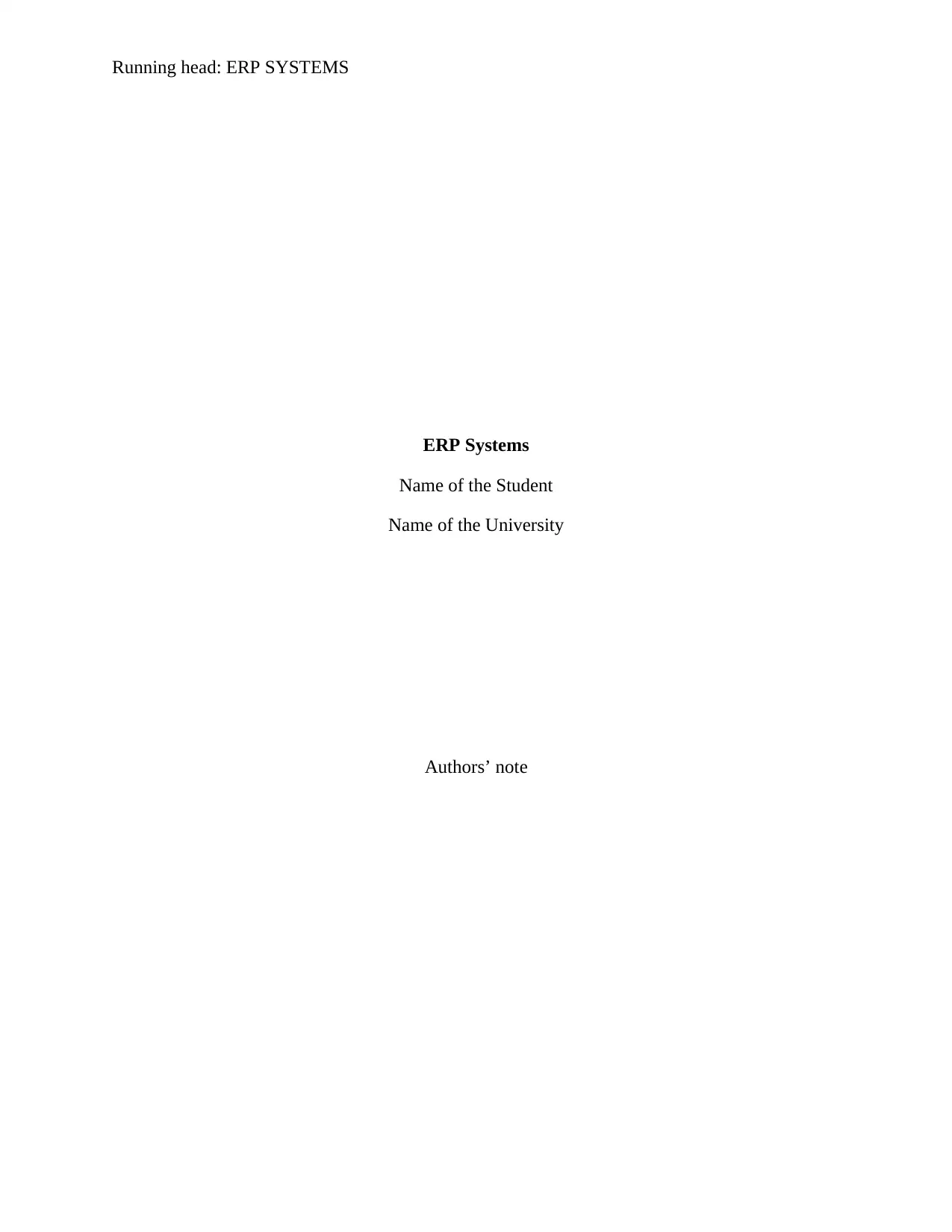
Running head: ERP SYSTEMS
ERP Systems
Name of the Student
Name of the University
Authors’ note
ERP Systems
Name of the Student
Name of the University
Authors’ note
Paraphrase This Document
Need a fresh take? Get an instant paraphrase of this document with our AI Paraphraser
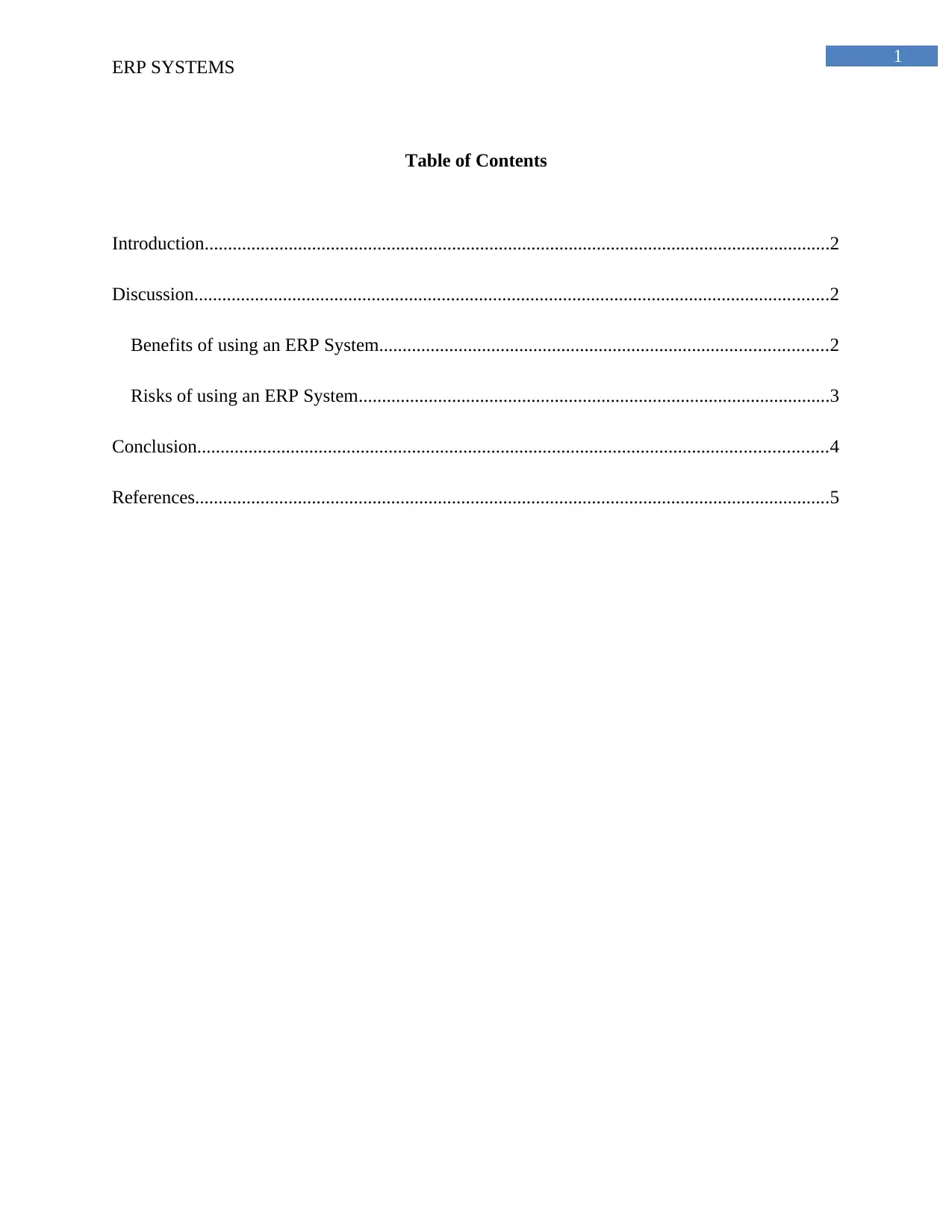
1
ERP SYSTEMS
Table of Contents
Introduction......................................................................................................................................2
Discussion........................................................................................................................................2
Benefits of using an ERP System................................................................................................2
Risks of using an ERP System.....................................................................................................3
Conclusion.......................................................................................................................................4
References........................................................................................................................................5
ERP SYSTEMS
Table of Contents
Introduction......................................................................................................................................2
Discussion........................................................................................................................................2
Benefits of using an ERP System................................................................................................2
Risks of using an ERP System.....................................................................................................3
Conclusion.......................................................................................................................................4
References........................................................................................................................................5
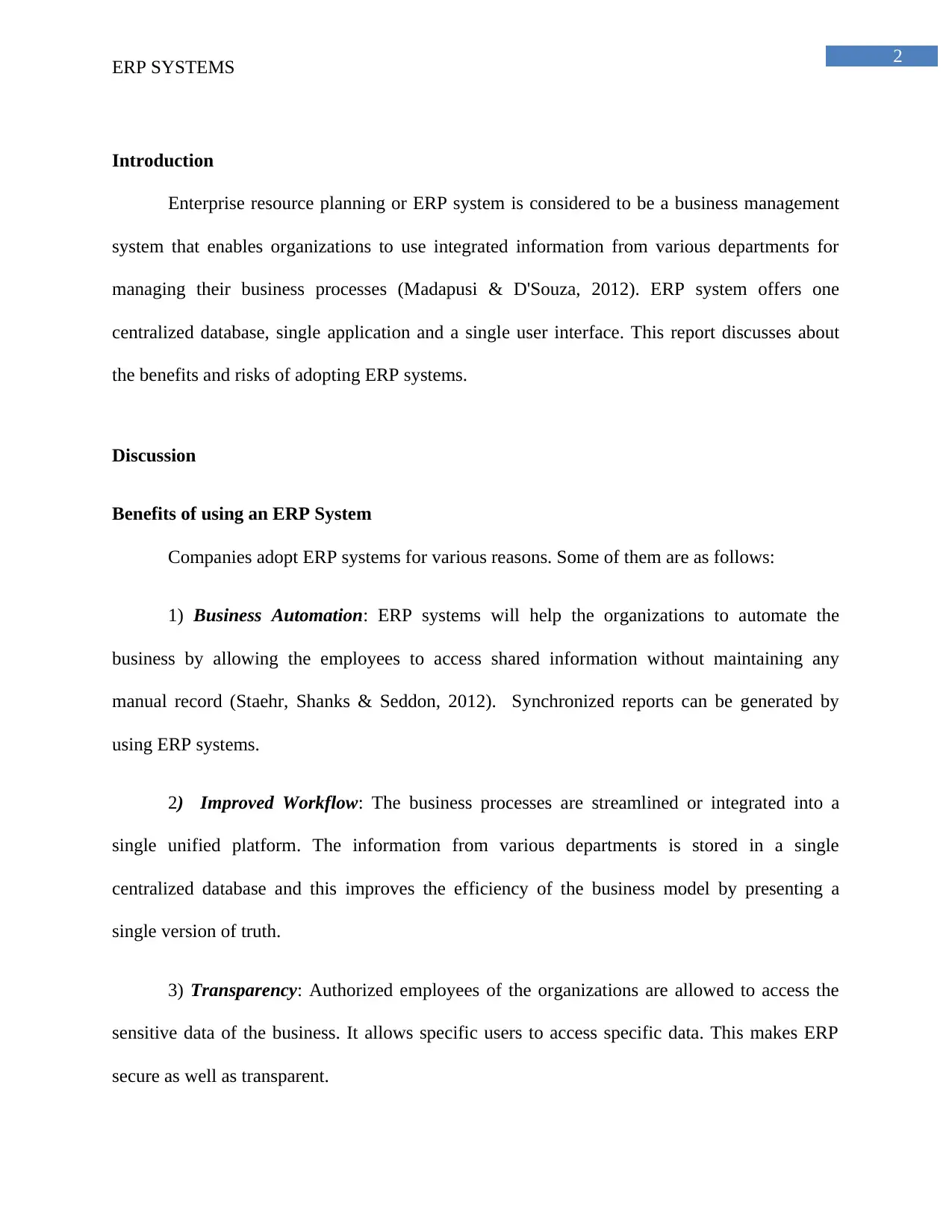
2
ERP SYSTEMS
Introduction
Enterprise resource planning or ERP system is considered to be a business management
system that enables organizations to use integrated information from various departments for
managing their business processes (Madapusi & D'Souza, 2012). ERP system offers one
centralized database, single application and a single user interface. This report discusses about
the benefits and risks of adopting ERP systems.
Discussion
Benefits of using an ERP System
Companies adopt ERP systems for various reasons. Some of them are as follows:
1) Business Automation: ERP systems will help the organizations to automate the
business by allowing the employees to access shared information without maintaining any
manual record (Staehr, Shanks & Seddon, 2012). Synchronized reports can be generated by
using ERP systems.
2) Improved Workflow: The business processes are streamlined or integrated into a
single unified platform. The information from various departments is stored in a single
centralized database and this improves the efficiency of the business model by presenting a
single version of truth.
3) Transparency: Authorized employees of the organizations are allowed to access the
sensitive data of the business. It allows specific users to access specific data. This makes ERP
secure as well as transparent.
ERP SYSTEMS
Introduction
Enterprise resource planning or ERP system is considered to be a business management
system that enables organizations to use integrated information from various departments for
managing their business processes (Madapusi & D'Souza, 2012). ERP system offers one
centralized database, single application and a single user interface. This report discusses about
the benefits and risks of adopting ERP systems.
Discussion
Benefits of using an ERP System
Companies adopt ERP systems for various reasons. Some of them are as follows:
1) Business Automation: ERP systems will help the organizations to automate the
business by allowing the employees to access shared information without maintaining any
manual record (Staehr, Shanks & Seddon, 2012). Synchronized reports can be generated by
using ERP systems.
2) Improved Workflow: The business processes are streamlined or integrated into a
single unified platform. The information from various departments is stored in a single
centralized database and this improves the efficiency of the business model by presenting a
single version of truth.
3) Transparency: Authorized employees of the organizations are allowed to access the
sensitive data of the business. It allows specific users to access specific data. This makes ERP
secure as well as transparent.
⊘ This is a preview!⊘
Do you want full access?
Subscribe today to unlock all pages.

Trusted by 1+ million students worldwide
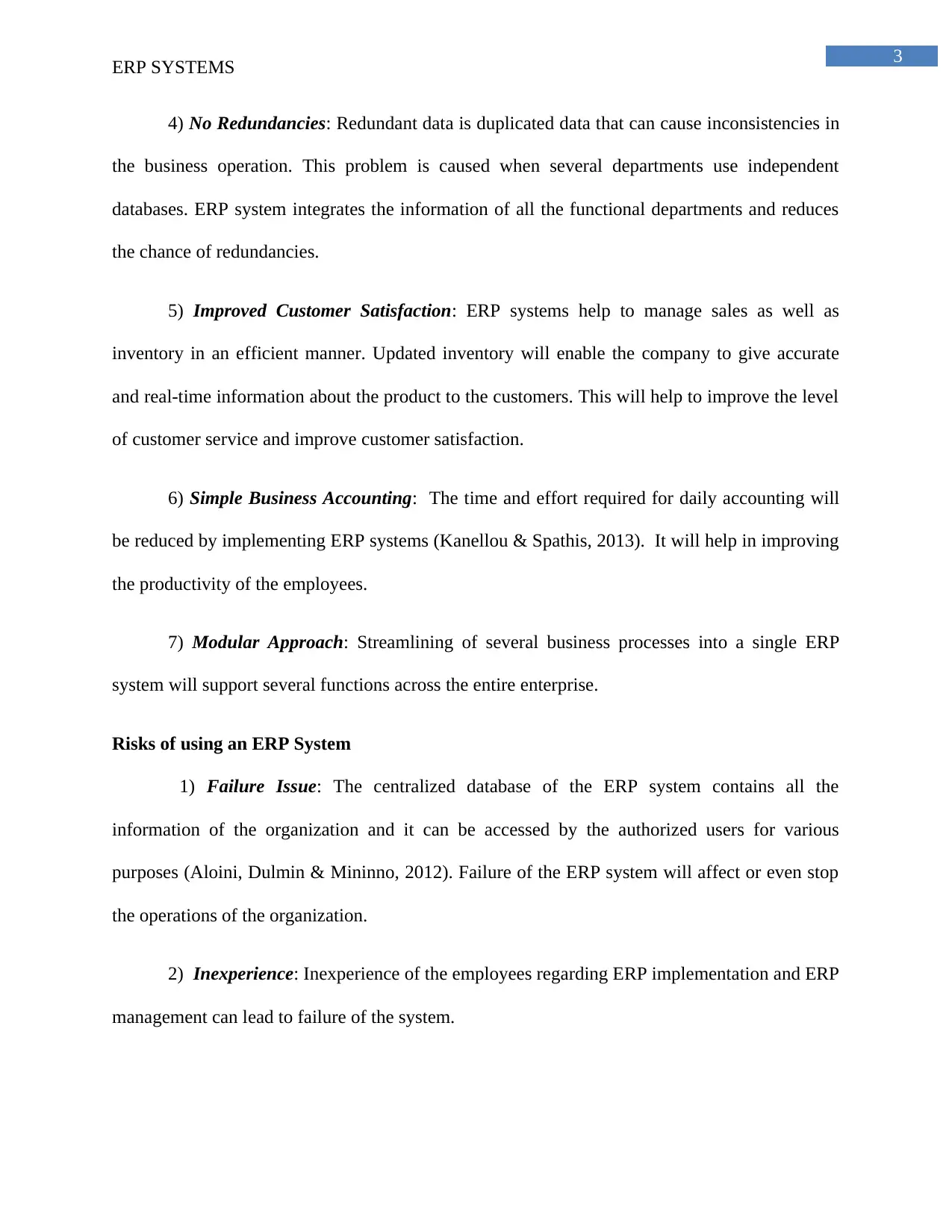
3
ERP SYSTEMS
4) No Redundancies: Redundant data is duplicated data that can cause inconsistencies in
the business operation. This problem is caused when several departments use independent
databases. ERP system integrates the information of all the functional departments and reduces
the chance of redundancies.
5) Improved Customer Satisfaction: ERP systems help to manage sales as well as
inventory in an efficient manner. Updated inventory will enable the company to give accurate
and real-time information about the product to the customers. This will help to improve the level
of customer service and improve customer satisfaction.
6) Simple Business Accounting: The time and effort required for daily accounting will
be reduced by implementing ERP systems (Kanellou & Spathis, 2013). It will help in improving
the productivity of the employees.
7) Modular Approach: Streamlining of several business processes into a single ERP
system will support several functions across the entire enterprise.
Risks of using an ERP System
1) Failure Issue: The centralized database of the ERP system contains all the
information of the organization and it can be accessed by the authorized users for various
purposes (Aloini, Dulmin & Mininno, 2012). Failure of the ERP system will affect or even stop
the operations of the organization.
2) Inexperience: Inexperience of the employees regarding ERP implementation and ERP
management can lead to failure of the system.
ERP SYSTEMS
4) No Redundancies: Redundant data is duplicated data that can cause inconsistencies in
the business operation. This problem is caused when several departments use independent
databases. ERP system integrates the information of all the functional departments and reduces
the chance of redundancies.
5) Improved Customer Satisfaction: ERP systems help to manage sales as well as
inventory in an efficient manner. Updated inventory will enable the company to give accurate
and real-time information about the product to the customers. This will help to improve the level
of customer service and improve customer satisfaction.
6) Simple Business Accounting: The time and effort required for daily accounting will
be reduced by implementing ERP systems (Kanellou & Spathis, 2013). It will help in improving
the productivity of the employees.
7) Modular Approach: Streamlining of several business processes into a single ERP
system will support several functions across the entire enterprise.
Risks of using an ERP System
1) Failure Issue: The centralized database of the ERP system contains all the
information of the organization and it can be accessed by the authorized users for various
purposes (Aloini, Dulmin & Mininno, 2012). Failure of the ERP system will affect or even stop
the operations of the organization.
2) Inexperience: Inexperience of the employees regarding ERP implementation and ERP
management can lead to failure of the system.
Paraphrase This Document
Need a fresh take? Get an instant paraphrase of this document with our AI Paraphraser

4
ERP SYSTEMS
3) System crash: Outdated software can crash the system and also cause integration
issues. If the software update is delayed then this can also lead to software vulnerabilities (Leon,
2014).
4) Expensive: The cost of planning, configuration, customization, testing and
implementation of an ERP system is high.
5) Security Threats: Inadequate access control mechanism can cause security threat to
the sensitive data that is present in the centralized database (Seo, 2013). There are chances of
DoS attacks and insider threats as well.
Conclusion
This report concludes that companies will be benefitted by adopting ERP systems. It
discussed about few advantages like improved workflow and business operations of the
company. It also pointed out certain risks of using ERP systems like system crash and security
threats.
ERP SYSTEMS
3) System crash: Outdated software can crash the system and also cause integration
issues. If the software update is delayed then this can also lead to software vulnerabilities (Leon,
2014).
4) Expensive: The cost of planning, configuration, customization, testing and
implementation of an ERP system is high.
5) Security Threats: Inadequate access control mechanism can cause security threat to
the sensitive data that is present in the centralized database (Seo, 2013). There are chances of
DoS attacks and insider threats as well.
Conclusion
This report concludes that companies will be benefitted by adopting ERP systems. It
discussed about few advantages like improved workflow and business operations of the
company. It also pointed out certain risks of using ERP systems like system crash and security
threats.
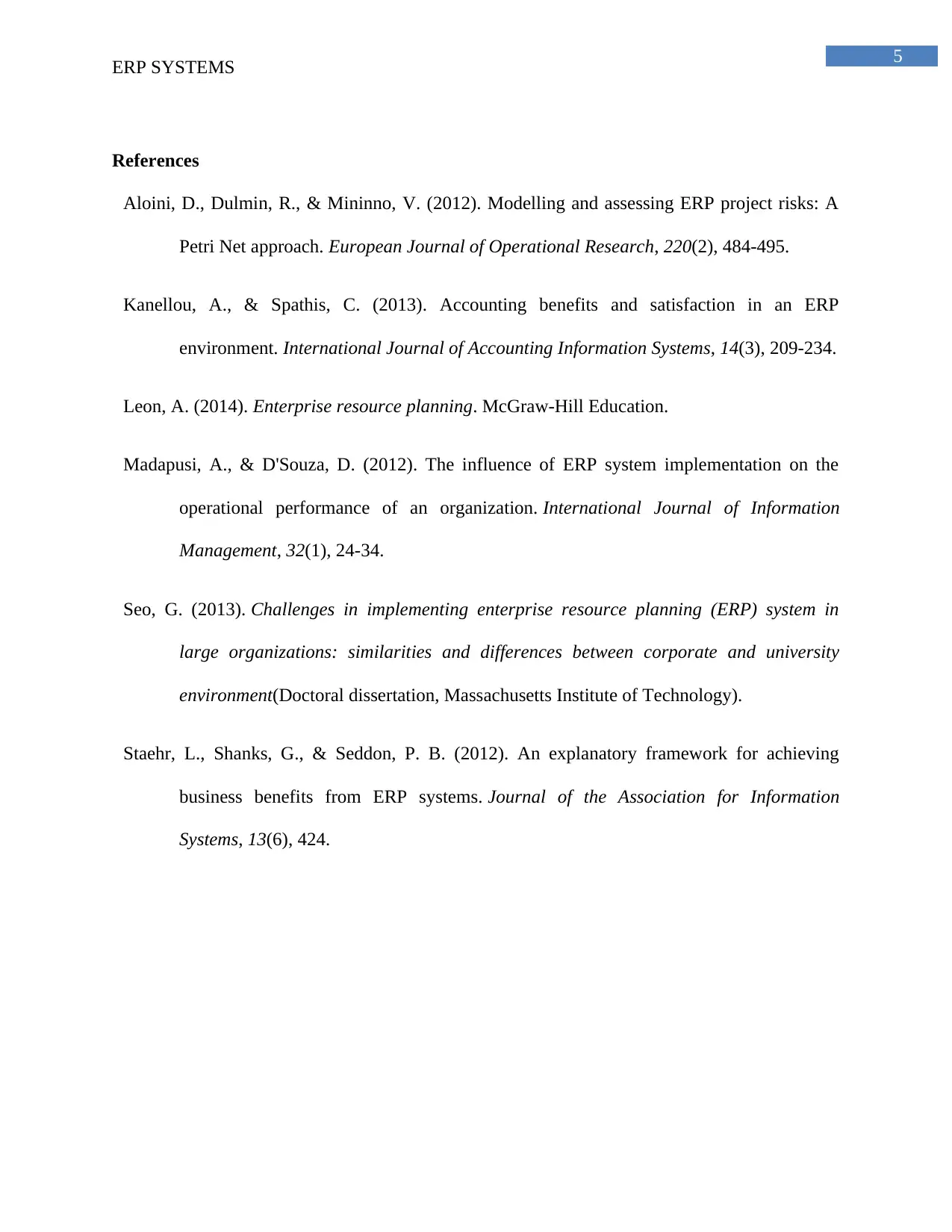
5
ERP SYSTEMS
References
Aloini, D., Dulmin, R., & Mininno, V. (2012). Modelling and assessing ERP project risks: A
Petri Net approach. European Journal of Operational Research, 220(2), 484-495.
Kanellou, A., & Spathis, C. (2013). Accounting benefits and satisfaction in an ERP
environment. International Journal of Accounting Information Systems, 14(3), 209-234.
Leon, A. (2014). Enterprise resource planning. McGraw-Hill Education.
Madapusi, A., & D'Souza, D. (2012). The influence of ERP system implementation on the
operational performance of an organization. International Journal of Information
Management, 32(1), 24-34.
Seo, G. (2013). Challenges in implementing enterprise resource planning (ERP) system in
large organizations: similarities and differences between corporate and university
environment(Doctoral dissertation, Massachusetts Institute of Technology).
Staehr, L., Shanks, G., & Seddon, P. B. (2012). An explanatory framework for achieving
business benefits from ERP systems. Journal of the Association for Information
Systems, 13(6), 424.
ERP SYSTEMS
References
Aloini, D., Dulmin, R., & Mininno, V. (2012). Modelling and assessing ERP project risks: A
Petri Net approach. European Journal of Operational Research, 220(2), 484-495.
Kanellou, A., & Spathis, C. (2013). Accounting benefits and satisfaction in an ERP
environment. International Journal of Accounting Information Systems, 14(3), 209-234.
Leon, A. (2014). Enterprise resource planning. McGraw-Hill Education.
Madapusi, A., & D'Souza, D. (2012). The influence of ERP system implementation on the
operational performance of an organization. International Journal of Information
Management, 32(1), 24-34.
Seo, G. (2013). Challenges in implementing enterprise resource planning (ERP) system in
large organizations: similarities and differences between corporate and university
environment(Doctoral dissertation, Massachusetts Institute of Technology).
Staehr, L., Shanks, G., & Seddon, P. B. (2012). An explanatory framework for achieving
business benefits from ERP systems. Journal of the Association for Information
Systems, 13(6), 424.
⊘ This is a preview!⊘
Do you want full access?
Subscribe today to unlock all pages.

Trusted by 1+ million students worldwide
1 out of 6
Related Documents
Your All-in-One AI-Powered Toolkit for Academic Success.
+13062052269
info@desklib.com
Available 24*7 on WhatsApp / Email
![[object Object]](/_next/static/media/star-bottom.7253800d.svg)
Unlock your academic potential
Copyright © 2020–2026 A2Z Services. All Rights Reserved. Developed and managed by ZUCOL.





